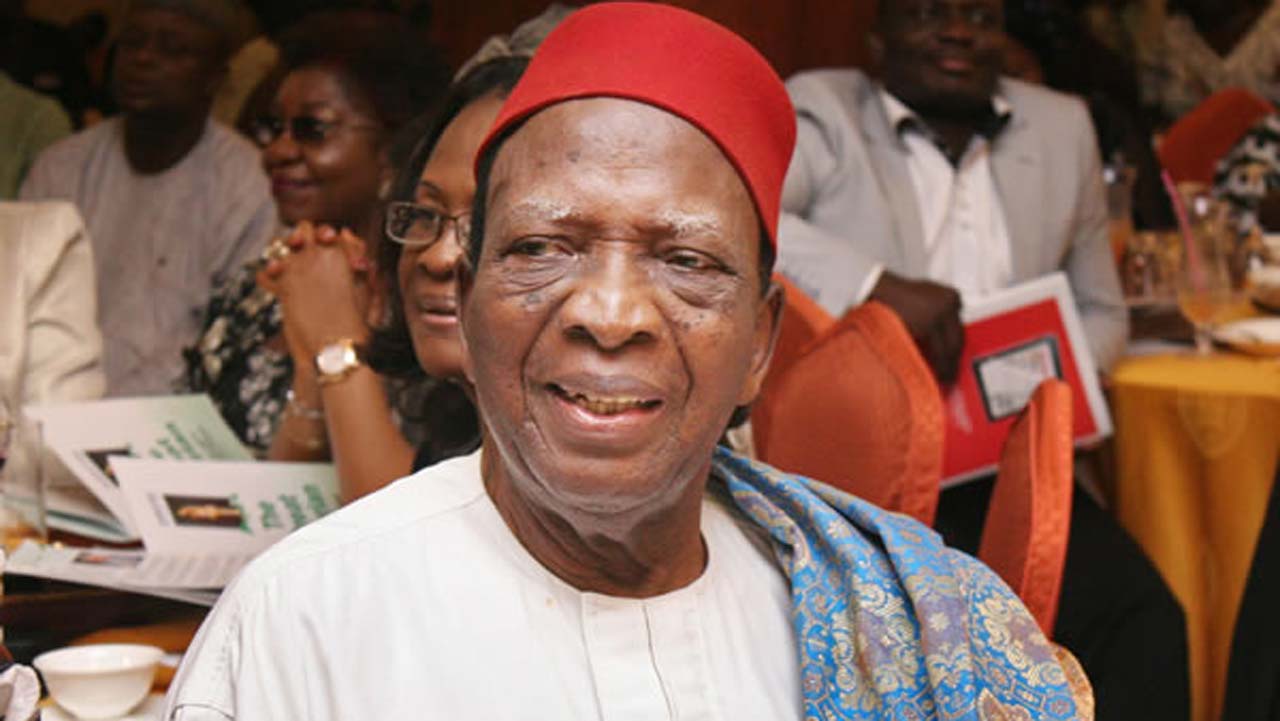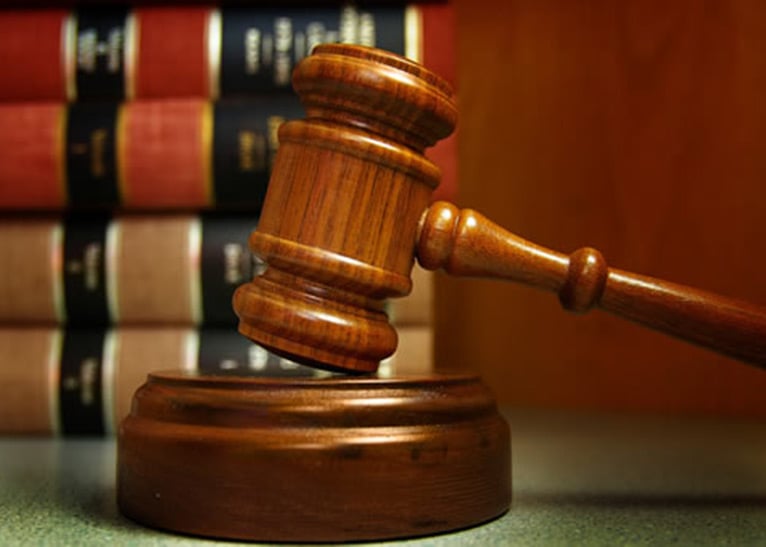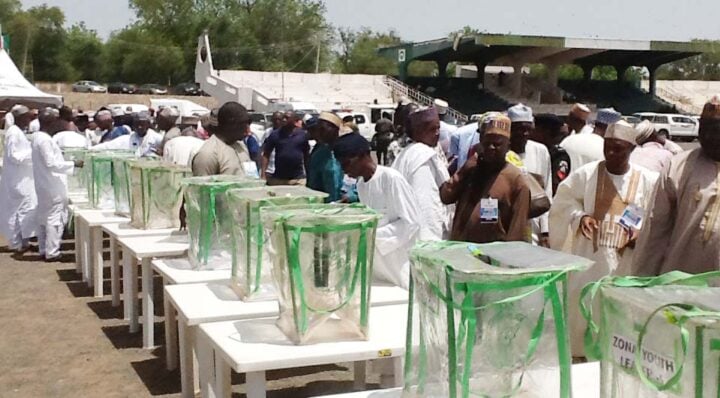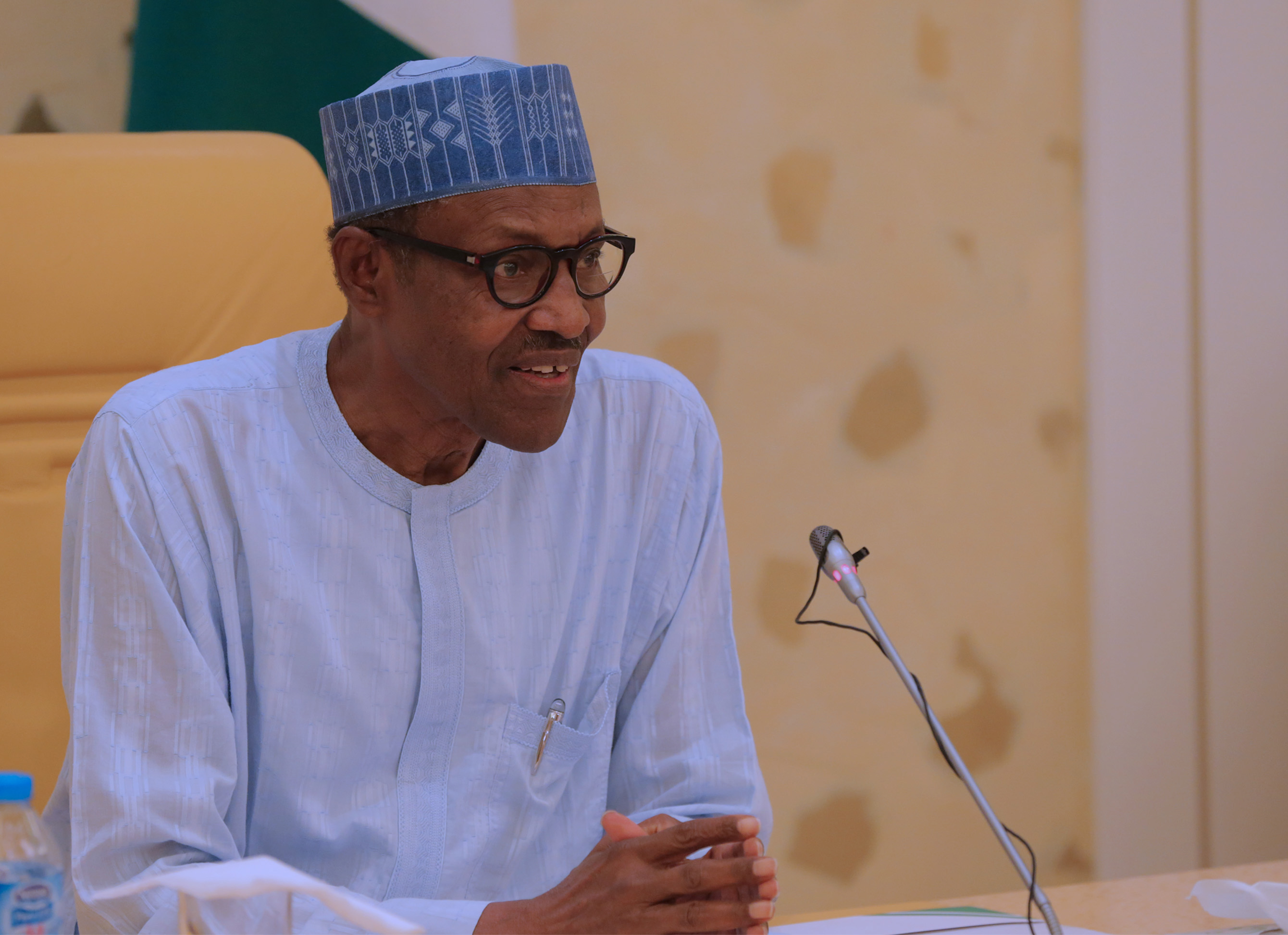Ben Nwabueze, a senior advocate of Nigeria (SAN), has faulted the June 12 declaration made by President Muhammadu Buhari.
In a statement, he personally signed, Nwabueze described the declaration as “unconstitutional, a masterstroke of mischief and insincerity and a deceitful contrivance”.
On June 6, Buhari announced the conferment of the Grand Commander of the Federal Republic (GCFR), the highest honour in the land, on MKO Abiola, while the investiture held on June 12.
The president also declared June 12 would replace May 29 as Democracy Day.
Advertisement
The development had generated mixed reactions among Nigerians.
Nwabueze said the president’s declaration “raises several issues concerning, first, the intention behind it, whether it is motivated by the public interest or by a political desire to secure the votes of Nigerians in the 2019 election, especially the votes of people of the south-west or to sow the seed of division among the members of the national assembly”.
“A motive of mischief seems evident on the face of the declaration,” he said, adding: “It is indeed a masterstroke of mischief and insincerity, a deceitful contrivance, suddenly and mischievously trumped up to rescue his dying image three years after his installation as president.”
Advertisement
The jurist said the annulled June 12 election deemed in law not to have taken place, and as such June 12 cannot be declared Democracy Day and a public holiday.
He also argued that Abiola, the presumed winner of the election and Babagana Kingibe, his running mate, cannot be awarded the national honour of GCFR and GCON respectively.
Reacting to the senate resolution that the Independent National Electoral Commission (INEC) should declare Abiola the winner of the 1993 presidential election, Nwabueze said the commission lacks the power to do so.
He said the powers of INEC, as conferred on it by paragraph 15 of the third schedule to the 1999 constitution, is “to organise, undertake and supervise” presidential and other listed elections, and that section 70 of the Electoral Act stipulates that the winner in an election “shall be declared elected by the appropriate returning officer”.
Advertisement
Nwabueze’s full statement has been reproduced below:
In a special press statement signed by himself personally, which is unprecedented, President Buhari made the following momentous announcement:
“For the past 18 years, Nigerians have been celebrating May 29th, as Democracy Day. That was the date when for the second time in our history, an elected civilian administration took over from a military government. The first time this happened was on October 1st, 1979.
But in the view of Nigerians, as shared by this Administration, June 12th, 1993, was far more symbolic of Democracy in the Nigerian context than May 29th or even the October 1st.
Advertisement
June 12th, 1993 was the day when Nigerians in millions expressed their democratic will in what was undisputedly the freest, fairest and most peaceful elections since our Independence. The fact that the outcome of that election was not upheld by the then Military Government does not distract from the democratic credentials of that process.
Accordingly, after due consultations, the Federal Government has decided that henceforth, June 12th will be celebrated as Democracy Day. Therefore, Government has decided to award posthumously the highest honour of the land, GCFR, to late Chief MKO Abiola, the presumed winner of the June 12th, 1993 cancelled elections. His running mate as Vice President, Ambassador Baba Gana Kingibe, is also to be invested with a GCON. Furthermore, the tireless fighter for human rights and the actualization of the June election and indeed for Democracy in general, the late Chief Gani Fawehinmi, SAN, is to be awarded a GCON posthumously.
Advertisement
The commemoration and investiture will take place on Tuesday, June 12, 2018, a date which in future years will replace May 29th as a National Public Holiday in celebration of Nigeria Democracy Day”.
LEGAL ISSUES ARISING FROM THE PRESIDENT’S DECLARATION
Advertisement
The President’s Declaration raises several issues concerning, first, the intention behind it, whether it is motivated by the public interest or by a political desire to secure the votes of Nigerians in the 2019 election, especially the votes of people of the South-West or to sow the seed of division among the members of the National Assembly in order to scuttle the threat to impeach him or to throw the country into turmoil or to smear the polity with the taint of illegality. A motive of mischief seems evident on the face of the Declaration. It is indeed a masterstroke of mischief and insincerity, a deceitful contrivance, suddenly and mischievously trumped up to rescue his dying image three years after his installation as President.
But the question of primary interest to us here concerns the legal aspects of the President’s Declaration, which raise three issues of some intricacy , viz (a) whether what he calls the cancellation of the June 12 election by the then Military Government is binding legally on him and Nigerians generally, or putting it differently, whether as President he has the power or competence to overturn or disregard the cancellation without an Act of the National Assembly repealing it; (b) the legal effects of the cancellation; and (c) whether the President’s 6th June Declaration does not require, as a condition for its effectiveness in law, that the results of the June 12 election should have been officially announced and Chief Abiola officially declared its winner.
Binding force of the annulment of the June 12 election by a Decree of the Federal Military Government (FMG)
It is as indisputable that a presidential election was, as a matter of fact, held on June 12, 1993 as that the said election was, as a matter both of fact and law, annulled by a Decree of the Federal Military Government (FMG) Decree No. 61 of 1993. The binding force, or rather the supremacy, of Decrees of the FMG has a history which it is appropriate to recall here. The issue of the binding force or supremacy of Decrees was settled with finality 48 years ago by the Federal Military Government (Supremacy and Enforcement of Powers) Decree 1970 re-enacted by Decree 13 of 1984 made by Gen Buhari as the then Head of the FMG. (He, Gen Buhari, enacted 37 Decrees during his one year rule in 1984 as Head of the FMG). Even the 1999 Constitution from which he derives his authority as President to make the June 6 Declaration is the product of a Decree, Decree 24 of 1999 to which that Constitution is scheduled. The 1999 Constitution itself, in its section 315(4)(d), recognises the annulment Decree 61 of 1993 as an existing law. So President Buhari has no moral right or justification to disregard or disdain Decree 61 of 1993 or to do things as please him, as if that law does not exist.
Advertisement
Nigeria is or is supposed to be a law-governed state, a state of law where the Rule of Law reigns and governs not only the lives and affairs of people in society, but also the actions of government. It is an axiomatic principle, accepted nearly by all, that democracy cannot meaningfully exist or function without the Rule of Law any more than it can meaningfully exist or function without Justice. Nigeria itself cannot exist without the Rule of Law – and Justice too.
Of the two cardinal principles of governance, the Rule of Law is more fundamental and overriding, since the Justice talked about is justice according to law. The alternative to the Rule of Law is anarchy and the ruin of communal life. Respect for the Rule of Law must not therefore be sacrificed to the need for Justice. We must strive to pursue and maintain both subject to the more overriding demands of the Rule of Law.
Nigeria, our dear country, should not be turned into a state where the President can, in his unfettered whim, set aside the law or do things contrary to the law; his June 6 2018 Declaration clearly affronts the law. The annulment of the June 12 1993 election is admittedly loathesome to millions of Nigerians because of its injustice, inhumanity and its culmination in the sad death of its presumed winner, Chief Abiola; its error has been acknowledged and duly apologised for by its author, Gen Babangida. The annulment should therefore be set aside, but that should be done in due form of law, i.e. in a manner required by law, meaning by an Act of the National Assembly, not by the President’s unilateral Declaration unbacked by an enabling law. The process of getting an enabling law enacted may take more time than is agreeable, but it is better to follow the process dictated by law.
Legal effects of the annulment of the June 12, 1993 presidential election by a Decree of the FMG
The legal effects of nullity are authoritatively stated by Lord Denning in the Judicial Committee of the Privy Council in an appeal from the West African Court of Appeal in Macfoy v. United Africa Co. Ltd [1961] 3 WLR 1405 at pp. 1409 – 1410:
“If an act is void, then it is in law a nullity. It is not only bad, but incurably bad. There is no need for an order of the Court to set it aside. It is automatically null and void without more ado, though it is sometimes convenient to have the court declare it to be so. And every proceeding which is founded on it is also bad and incurably bad. You cannot put something on nothing and expect it to stay there. It will collapse.” (emphasis supplied).
Lord Denning’s statement of the law on the point was echoed by Oputa JSC in Adejumo v. Ayantegba [1989] 3 NWLR (pt. 110) 417 at p. 451. Said he:
“If a transaction is void, it is in law a nullity, not only bad, but incurably bad and nothing can be founded on it, for having no life of its own, it cannot vivify anything.” (emphasis supplied).
The legal implication is thus that an act or transaction which is a nullity is in law regarded as having no existence or never to have come into existence at all. Both Lord Denning M.R. in Macfoy v. United Africa Co. Ltd [1961] 3 WLR 1409 – 1410 and Oputa JSC in Adejumo v. Ayantegbe [1989] 3 NWLR (Pt 110) 417 at page 451 describe it as amounting to “nothing”. Its non-existence or nothingness arises from operation of law and does not depend on a court’s decision declaring it null and void, which only re-affirms and reinforces its inherent nullity. The dictionary definition is at one with the law on this. Collins English Dictionary defines “nullify”, and “void” as “having no effect or existence”. “Nullity” is defined in New Webster’s Dictionary of the English Language as “nothingness”.
It follows that the annulled June 12 election, deemed in law not to have taken place and to have no existence and therefore to amount to nothing, cannot vivify or give life to anything; June 12 cannot be declared Democracy Day and a public holiday, and Chief Abiola the “presumed” winner of the June 12 election and his running mate, Amb. Kingibe, cannot be awarded the national honour of GCFR and GCON respectively based on their presumed victory in the June 12 election. Both the declaration and the award are illegal, null and void; the annulment Decree, No. 61 of 1993, an existing law under section 315(4)(d) of the 1999 Constitution, must first be repealed – with effect from a date before June 12, 1993 – before the declaration and the award can legally or lawfully be made. The point being made here, and on which we insist, is that, as a country committed to respect for the Rule of Law, the law should be duly followed and not disregarded, as if we are still in a military dictatorship.
Whether the President’s 6th June Declaration does not require, as a condition for its effectiveness, that the results of the June 12 election should have been officially announced and Chief Abiola officially declared its winner
The repeal of the annulment Decree, No. 61 of 1993, does not dispose of all the legal issues arising from President Buhari’s 6th June 2018 momentous Declaration. It is not enough for the purposes of the law to presume Chief Abiola as the winner of the June 12, 1993 election, whatever that means. To presume something means, according to its dictionary definition, to “suppose or believe without examination; to assume beforehand”. The results o the June 12, 1993 election should have been officially announced and Chief Abiola should have officially declared its winner to form a legally valid basis for the declaration of June 12 as Democracy Day to be henceforth observed and celebrated as a public holiday in the country, and before Chief Abiola can be awarded and invested with the national honour of GCFR, the highest honour that is reserved for a President of Nigeria. He cannot be President-elect, which is necessary to qualify him to be so to be treated, unless the results of the election have been officially announced and he has been officially declared elected.
The law is clear and emphatic on the matter. Section 70 of the Electoral Act in force today (June 11, 2018) provides:
“In an election to the office of the President or Governor whether or not contested and in any contested election to any other elective office, the result shall be ascertained by counting the votes cast for each candidate and [the candidate that satisfied] the provisions of sections 133, 134 and 179 of the Constitution……..shall be declared elected by the appropriate Returning Officer”;
The word “declared” is italicized to emphasise that a candidate “deemed duly elected” under section 179 of the Constitution must formally be “declared elected by the appropriate returning officer” under section 70 of the Act.
The National Assembly has proposed that the Independent Electoral Commission (INEC) should now formally announce the results of the June 12 1993 election and declare Chief Abiola its winner. This proposal raises the question whether INEC, constituted under the 1999 Constitution (section 153), has the competence to announce the results of an election that took place 25 years ago, and declare a candidate under it the winner, so as to constitute him President-elect. The power of INEC, as conferred on it by paragraph 15 of the Third Schedule to the Constitution, is power, among other things, “to organise, undertake and supervise” presidential and other listed elections. By its terms, the power is power to organize, undertake and supervise elections in the present and in the future; it does not authorize or enable the Commission to do anything in relation to an election that took place in the past – 25 years ago – and organized and conducted by a differently constituted Electoral Commission. It may be that under the residual clause of paragraph 15 above authorizing INEC to “carry out such other functions as may be conferred upon it by an Act of the National Assembly”, the Assembly may make a law enabling INEC in the behalf. Even so, the problem will still remain as to how the provision of section 70 of the Electoral Act is to be complied with, having regard to the specificity of the words “shall be declared elected by the appropriate Returning Officer”; the reference is to the particular returning officer involved in or who took part in the conduct of the particular election.
President Buhari’s 6th June 2018 Declaration disdains the law of the land in other respects
The sacroscanctity and supremacy of the Rule of Law, as a principle in the government of society, need to be reinterated. Although not expressly enshrined by name in our Constitution, as is done in some of the modern constitutions in the world, like the Constitutions of Romania and Bulgaria and Czechoslovakia’s Charter of Fundamental Rights and Freedoms, all three adopted in 1991 after the collapse of communism in the 1989 – 90 world-wide democratic revolution, the Rule of Law is embodied and incorporated in our Constitution as an inarticulate major premise, to borrow the pithy phrase of the great Justice Oliver Wendell Holmes of the U.S. Supreme Court. Thus, the supremacy of the Constitution, as provided in its section 1(1), enures, by extension, to the Rule of Law, as incorporated in it as an inarticulate major premise, overriding any action or declaration of government that is inconsistent with the principle: section 1(3).
The question again arises whether the posthumous awards of the national honours of GCFR and GCON to Chief Abiola and Chief Fawehinmi respectively accord or are consistent with the law of the land – National Honours Act. The Act does not, by its express provisions, authorize posthumous awards, nor do those provisions give any indication that they contemplate posthumous awards. The indication is indeed to the contrary; it (the indication) comes from the provision that “a person”, meaning a living, not a dead person, “shall not be eligible for appointment to any rank of an Order unless he is a citizen of Nigeria”, and that “a person shall be appointed to a particular rank of an Order when he receives from the President in person at an investiture held for the purpose (a) the insignia appropriate for that rank; and (b) an instrument under the hand of the President and the public seal of the Federation declaring him to be appointed to that rank”.
The words “when he receives from the President in person” exclude posthumous awards, a view that derives support from the fact that no posthumous award had ever been made in the past to any one before the awards to Chief Abiola and Chief Fawehinmi. There is, however, a provision in the Act that seems to give a lot of leeway to the President. It says : “The President may, by warrant, make provision for the award of titles of honour, decorations and dignities”. It may be that posthumous awards are not authorized by the Act as a matter of policy decision. If so the Act needs to be amended to change the policy.
President Buhari could not have been more disdainful, and more careless, he could not have made a greater mockery, of the Rule of Law than by his announcement on June 6, 2018 of the decision of the Federal Government that “henceforth June 12 will be celebrated as Democracy Day”, knowing, as he well does, that May 29 is enacted by law, the Public Holidays Act, as Democracy Day, and that that could not be changed to June 12, except by amendment of the Act, not by mere presidential Declaration; and that his wishes, intentions and whims, however pure and benevolent, are not law, as in the days of the absolutist military dictatorship when laws could be made simply by word of mouth, later to be put in written form by Decree or Edict. It is incredible that, knowing all this but still believing himself to be an absolute ruler, he went ahead to organize the farce of commemoration ceremony on June 12 at the Banquet Hall of the Presidential Villa. His perception of himself as absolute ruler is antithetical to constitutional democracy, and constitutes a danger to the country. He should be made to shed that perception of himself.
Add a comment







